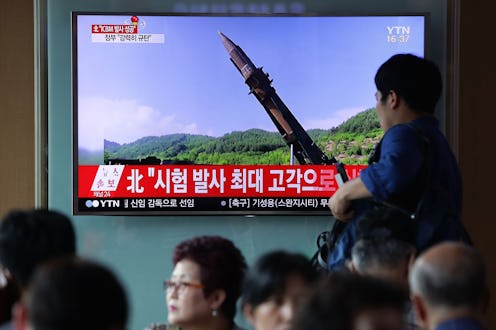News
A North Korean ICBM Missile May Now Be Able To Reach Alaska

The pressure on the Korean peninsula was ratcheted up once again Tuesday morning with the reported test of an intercontinental ballistic missile (ICBM). The North Korean government claims this one was launched successfully, which — if true — could spell trouble for the United States. But how far can an ICBM missile go?
The type that North Korea tested this time has a theoretical range of 10,000 km, or about 6,214 miles, CNN reported. While that doesn't mean it could make its full theoretical range of 6,214 miles, it could certainly make a significant portion of it. The estimate provided by Fox News after speaking with experts was 4,000 miles. That means it could reach Alaska.
According to North Korea, the test of the ICBM was a success and the U.S. military has now confirmed that it was indeed conducted. U.S. Pacific Command also told Fox News that the missile remained in the air longer than any to date. The U.S. military reported that it remained airborne for 37 minutes and reached a height of 1,500 miles.
The other key fear is whether or not North Korea can fit a nuclear warhead on the missile. U.S. security experts say that even though the country hasn't achieved that yet, it soon could. The combination of a the warhead and a long-range ICBM could eventually put the whole continental United States, save Florida, at risk. The situation is not yet that dire, but North Korea is a significant step closer.
At this point the only response from the White House has been President Trump's Twitter. "Hard to believe that South Korea and Japan will put up with this much longer. Perhaps China will put a heavy move on North Korea and end this nonsense once and for all!" Trump sent out in the early hours Tuesday.
Any response from South Korea or Japan would drag in the United States given our treaty obligations with both these allies. Thus, what's actually in the best interest for the United States, and the region generally, would be for China to have a stronger role in dissuading further development of ICBMs or warheads in the North. As the North's main trading partner and only powerful ally, China has a lot of influence on the nation.
Trump knows this and spoke with the Chinese President Xi Jinping on Sunday. He told the leader that the United States is willing to go it alone against the small Communist state if need be. That doesn't have to be militarily, but it could be done with more sanctions on Chinese banks that do business with North Korea, for example.
Both Russia and China have already called on the North to stop the missile tests, the BBC reported. The two countries used the word "unacceptable" but also called on South Korea and the United States to scrap plans to install a missile defense system in the South that would lend protection from future test launches or attacks.
For now it's just Alaska and allies in the region who must be scared. But with new technological developments in the North, the area of the world at risk could grow to include major U.S. populations centers.